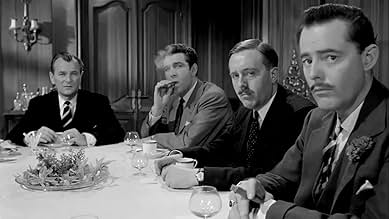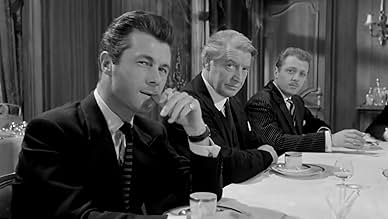NOTE IMDb
7,2/10
5,6 k
MA NOTE
Récemment mis à la retraite, le lieutenant-colonel Hyde décide de se venger et réunit sept officiers renvoyés de l'armée pour commettre un casse.Récemment mis à la retraite, le lieutenant-colonel Hyde décide de se venger et réunit sept officiers renvoyés de l'armée pour commettre un casse.Récemment mis à la retraite, le lieutenant-colonel Hyde décide de se venger et réunit sept officiers renvoyés de l'armée pour commettre un casse.
- Réalisation
- Scénario
- Casting principal
- Nomination aux 1 BAFTA Award
- 1 victoire et 1 nomination au total
John Adams
- Police Constable in Final Scene
- (non crédité)
Avis à la une
9sol-
This is a heist film that really rises above the ante of its genre, due to the motivations behind the main characters. The characters are all former army officers, who were dismissed due to misconduct on their behalf, with the exception of the mastermind behind the robbery, who brings them all together. His name is Hyde, and he was halfway to becoming a full colonel before the army forced him into retirement. He is separated from his wife, and without army life, he has nothing left to do. So for the fun of it, rather than the money, he organises a heist.
The acting in the film is superb. The expressions that Jack Hawkins uses when playing Hyde signify that he is in it for the thrills rather than the loot. He looks on with joy, rather than stern, careful consideration, as he and his men organise everything that they need to do. He is in power again, since he is the head of the operation, and since he knows that everyone who he picks will want to go along. All of his men are not only crooks but ones with financial problems. And as the only one with plenty of money and no criminal record, he enjoys the idea that he can duck out at any time.
The supporting actors also show in the end that they are enjoying their work. While initially in it for the money, the return to army regulations - by which Hyde runs the operation - excites them. Nigel Patrick and Bryan Forbes are particularly good as the more suave members of the heist team. One problem though is that we never get to know the characters really well. They are defined by what we are told about them, rather than their actions, particularly with the Padre, played by Roger Livesey. A former quartermaster, he shows excitement at being able to take up the job again, but he is given very limited screen time, and his involvement with acts unbefiting a priest is oft mentioned, but his personality rarely shows anything more than that he is just another one of the men.
I find it rather odd that the film is marketed as a comedy. There is one section, when they raid the army, that is bouncing with humorous touches, and Gerald Harper, as a nervous army captain, gives off an excellent performance. The rest of the film though only has the slightest edge of humour, from Hyde badmouthing his wife to a rather awkwardly inserted cameo by Oliver Reed as a homosexual performer. The comedy is not important though, and the plot is intriguing enough as it is, but it does make the raiding the army section stand out, as it jars the film's mood and style.
If not flawless, it is still a very well made film. The rousing, grand music score is excellent, not just because it fits well over the action, but because it is sort of a parody of the scores of old war movies. The film looks great in black and white, and some of the sequences are very well shot. One example that stands out in memory is a shot where the camera goes through the walls of two different rooms, crabbing to the right, and swooping a little bit, almost like a person trying to not bump into a vase as he passes through a wall. The visual look of the film and the audio are just excellent, and well suited to the interesting screenplay.
The acting in the film is superb. The expressions that Jack Hawkins uses when playing Hyde signify that he is in it for the thrills rather than the loot. He looks on with joy, rather than stern, careful consideration, as he and his men organise everything that they need to do. He is in power again, since he is the head of the operation, and since he knows that everyone who he picks will want to go along. All of his men are not only crooks but ones with financial problems. And as the only one with plenty of money and no criminal record, he enjoys the idea that he can duck out at any time.
The supporting actors also show in the end that they are enjoying their work. While initially in it for the money, the return to army regulations - by which Hyde runs the operation - excites them. Nigel Patrick and Bryan Forbes are particularly good as the more suave members of the heist team. One problem though is that we never get to know the characters really well. They are defined by what we are told about them, rather than their actions, particularly with the Padre, played by Roger Livesey. A former quartermaster, he shows excitement at being able to take up the job again, but he is given very limited screen time, and his involvement with acts unbefiting a priest is oft mentioned, but his personality rarely shows anything more than that he is just another one of the men.
I find it rather odd that the film is marketed as a comedy. There is one section, when they raid the army, that is bouncing with humorous touches, and Gerald Harper, as a nervous army captain, gives off an excellent performance. The rest of the film though only has the slightest edge of humour, from Hyde badmouthing his wife to a rather awkwardly inserted cameo by Oliver Reed as a homosexual performer. The comedy is not important though, and the plot is intriguing enough as it is, but it does make the raiding the army section stand out, as it jars the film's mood and style.
If not flawless, it is still a very well made film. The rousing, grand music score is excellent, not just because it fits well over the action, but because it is sort of a parody of the scores of old war movies. The film looks great in black and white, and some of the sequences are very well shot. One example that stands out in memory is a shot where the camera goes through the walls of two different rooms, crabbing to the right, and swooping a little bit, almost like a person trying to not bump into a vase as he passes through a wall. The visual look of the film and the audio are just excellent, and well suited to the interesting screenplay.
This 1959 (or 1960) film shares the same title as the 1990's comedy about weird northern folk, but is a far more savage satire of decay in the establishment.
A redundant Colonel recruits a unit of marginally more corrupted subordinate Army officers, to stage an American Style heist, based on a US pulp fiction novel. Very few of the characters would initially be associated with the establishment. Their past failings include treason, war-crimes and negligence resulting in deaths.
Jack Hawkins (Colonel Hyde) knits the characters together over the course of the film. By reinventing a form of army discipline the characters appear to rediscover their aplomb.
The actual robbery is almost incidental, occupying ~ 10% of the film.
My real fascination was with the development and interaction of the characters. Even 40 years on their callousness is at times shocking and the 'Blame Ireland' example of scapegoating still resonates, especially in the context of the characters' personal failures in other theatres of the ex-empire.
The film is nearly 2 hours long, but seemed much shorter. Post war film of the City of London (and elsewhere) before 60s redevelopment is a bonus.
A redundant Colonel recruits a unit of marginally more corrupted subordinate Army officers, to stage an American Style heist, based on a US pulp fiction novel. Very few of the characters would initially be associated with the establishment. Their past failings include treason, war-crimes and negligence resulting in deaths.
Jack Hawkins (Colonel Hyde) knits the characters together over the course of the film. By reinventing a form of army discipline the characters appear to rediscover their aplomb.
The actual robbery is almost incidental, occupying ~ 10% of the film.
My real fascination was with the development and interaction of the characters. Even 40 years on their callousness is at times shocking and the 'Blame Ireland' example of scapegoating still resonates, especially in the context of the characters' personal failures in other theatres of the ex-empire.
The film is nearly 2 hours long, but seemed much shorter. Post war film of the City of London (and elsewhere) before 60s redevelopment is a bonus.
This movie is an involving, intriguing and ultimately poignant heist thriller. Since the advent of a comedy TV show which took it's name, the TV Guides have taken to describing this film as a 'comedy'. Obviously they've never watched it - the moral is, get your movie info from IMDB, not a rubbish newspaper or magazine TV Guide.
The movie's premise is good - a disenchanted ex-army officer dispairs of success on 'civvy street' so decides to organize his own squad of former soldiers and pull off a military operation with a difference - they will rob a bank. This film was the inspiration to the real-life Great Train Robbery, which involved a 20-man gang stealing £3,500,000 in 1963.
Characterization is good and believable; as with all British movies of the era, there is an excrutiating tendency to overly-ingenious rhetoric, one wonders sometimes how they think of such witty remarks. That aside, it's thoroughly convincing. The film code of the day of course required that no film could ever show a criminal benefiting from his crime, but instead of the usual tiresome accidental spilling of the booty out of a train/car/plane window, we have a more realistic, and indeed somewhat sad resolution.
Yes, it is a bit old now, but if you can hang-up your hang-ups about that, you may find yourself pleasantly surprised.
The movie's premise is good - a disenchanted ex-army officer dispairs of success on 'civvy street' so decides to organize his own squad of former soldiers and pull off a military operation with a difference - they will rob a bank. This film was the inspiration to the real-life Great Train Robbery, which involved a 20-man gang stealing £3,500,000 in 1963.
Characterization is good and believable; as with all British movies of the era, there is an excrutiating tendency to overly-ingenious rhetoric, one wonders sometimes how they think of such witty remarks. That aside, it's thoroughly convincing. The film code of the day of course required that no film could ever show a criminal benefiting from his crime, but instead of the usual tiresome accidental spilling of the booty out of a train/car/plane window, we have a more realistic, and indeed somewhat sad resolution.
Yes, it is a bit old now, but if you can hang-up your hang-ups about that, you may find yourself pleasantly surprised.
It's very strange, but within the caper film genre, there are TONS of wonderful films....tons. Movies like "Rififi", "Grand Slam" and "The Italian Job" are all top entertainment...and "The League of Gentlemen" follows in this same tradition.
The film begins with Hyde (Jack Hawkings) sending an invitation to seven men. When the men all arrive at this dinner party, Hawkins shocks them all by telling them their sordid military histories. All served dishonorably and all are rogues...just the sort you'd like to recruit for some illegal acts. In this case, they will commit a very daring daytime bank robbery, but this is much later in the film. In the meantime, they all move in together and behave much like a precise military unit. Next, they have another, smaller but very daring raid to do so they'll have the proper equipment for the big robbery. How all this works together so precisely is why the film is worth seeing. Very well written, directed and acted--this is rousing entertainment from start to finish. It also offers enough novelty to make it different enough from these other films.
By the way, an interesting notion is the character played by Kieron Moore. Though never explicitly stated, it sure is apparent he's supposed to be gay. And, speaking of this, look for a tiny role played by a young Oliver Reed--a very, very stereotypically gay role...VERY.
The film begins with Hyde (Jack Hawkings) sending an invitation to seven men. When the men all arrive at this dinner party, Hawkins shocks them all by telling them their sordid military histories. All served dishonorably and all are rogues...just the sort you'd like to recruit for some illegal acts. In this case, they will commit a very daring daytime bank robbery, but this is much later in the film. In the meantime, they all move in together and behave much like a precise military unit. Next, they have another, smaller but very daring raid to do so they'll have the proper equipment for the big robbery. How all this works together so precisely is why the film is worth seeing. Very well written, directed and acted--this is rousing entertainment from start to finish. It also offers enough novelty to make it different enough from these other films.
By the way, an interesting notion is the character played by Kieron Moore. Though never explicitly stated, it sure is apparent he's supposed to be gay. And, speaking of this, look for a tiny role played by a young Oliver Reed--a very, very stereotypically gay role...VERY.
What a wonderful short review from Stewart Naunton, above! I thought this was just a sleeper movie that only I appreciated.
The gentlemen in question are men who were very good in the War but not very successful or appreciated between wars. What is more appropriate than that they extract a long-deserved payment by plotting and executing this intricate caper?
This is a movie with a deep moral message. The robbers are in the right, and it is a real shame that these heroes, for heroes they are, have to get nabbed at the end of the film. By rights they should not only have got away with their caper, they should have taken back their country from the small minds and souls that had commandeered it.
"You Never Had It So Good," was Macmillan's slogan in '59, but these ex-officers seem to have missed out on the fun everyone else is having. They have been shabbily treated by their country and you just have to root for them as they recover their talents and daring.
The movie makes a good companion piece for Basil Dearden's 1961 film 'Victim', which is thematically dissimilar but very much the same in appearance and feel.
The gentlemen in question are men who were very good in the War but not very successful or appreciated between wars. What is more appropriate than that they extract a long-deserved payment by plotting and executing this intricate caper?
This is a movie with a deep moral message. The robbers are in the right, and it is a real shame that these heroes, for heroes they are, have to get nabbed at the end of the film. By rights they should not only have got away with their caper, they should have taken back their country from the small minds and souls that had commandeered it.
"You Never Had It So Good," was Macmillan's slogan in '59, but these ex-officers seem to have missed out on the fun everyone else is having. They have been shabbily treated by their country and you just have to root for them as they recover their talents and daring.
The movie makes a good companion piece for Basil Dearden's 1961 film 'Victim', which is thematically dissimilar but very much the same in appearance and feel.
Le saviez-vous
- AnecdotesJack Hawkins was ill with cancer during filming. Shooting was shut down for several days.
- GaffesAs Col. Hyde is showing the movie of the exterior of the bank that they will rob he tells his cohorts, "This is the view of the bank that you will see three weeks from today, gentlemen." Sure enough, during the events just before the actual robbery: As the guard opens the rear door of the armored truck, the same-dressed man with a newspaper in his overcoat pocket walks past and, as the guards put the boxes on the flatbed truck, the same two women in light overcoats walk past.
- Citations
Major Race: Is that your wife?
Lt. Col. Hyde: Yes.
Major Race: Is she dead?
Lt. Col. Hyde: No, no. I regret to say the bitch is still going strong.
- ConnexionsFeatured in Le casse du siècle (2007)
Meilleurs choix
Connectez-vous pour évaluer et suivre la liste de favoris afin de recevoir des recommandations personnalisées
Détails
- Date de sortie
- Pays d’origine
- Langue
- Aussi connu sous le nom de
- The League of Gentlemen
- Lieux de tournage
- Société de production
- Voir plus de crédits d'entreprise sur IMDbPro
Box-office
- Budget
- 192 000 £GB (estimé)
- Durée
- 1h 56min(116 min)
- Couleur
- Mixage
- Rapport de forme
- 1.66 : 1
Contribuer à cette page
Suggérer une modification ou ajouter du contenu manquant






















